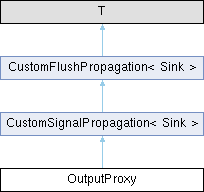Filter class that is a proxy for a sink.
More...
|
| | OutputProxy (BufferedTransformation &owner, bool passSignal) |
| | Construct an OutputProxy. More...
|
| |
| bool | GetPassSignal () const |
| | Retrieve passSignal flag. More...
|
| |
| void | SetPassSignal (bool passSignal) |
| | Set passSignal flag. More...
|
| |
|
byte * | CreatePutSpace (size_t &size) |
| |
|
size_t | Put2 (const byte *inString, size_t length, int messageEnd, bool blocking) |
| |
|
size_t | PutModifiable2 (byte *begin, size_t length, int messageEnd, bool blocking) |
| |
| void | Initialize (const NameValuePairs ¶meters=g_nullNameValuePairs, int propagation=-1) |
| | Initialize or reinitialize this object, with signal propagation. More...
|
| |
| bool | Flush (bool hardFlush, int propagation=-1, bool blocking=true) |
| | Flush buffered input and/or output, with signal propagation. More...
|
| |
|
bool | MessageSeriesEnd (int propagation=-1, bool blocking=true) |
| |
|
byte * | ChannelCreatePutSpace (const std::string &channel, size_t &size) |
| |
|
size_t | ChannelPut2 (const std::string &channel, const byte *begin, size_t length, int messageEnd, bool blocking) |
| |
|
size_t | ChannelPutModifiable2 (const std::string &channel, byte *begin, size_t length, int messageEnd, bool blocking) |
| |
|
bool | ChannelFlush (const std::string &channel, bool completeFlush, int propagation=-1, bool blocking=true) |
| |
|
bool | ChannelMessageSeriesEnd (const std::string &channel, int propagation=-1, bool blocking=true) |
| |
Filter class that is a proxy for a sink.
Used By ProxyFilter
- Since
- Crypto++ 4.0
Definition at line 990 of file filters.h.
◆ OutputProxy()
Construct an OutputProxy.
- Parameters
-
| owner | the owning transformation |
| passSignal | flag indicating if signals should be passed |
Definition at line 998 of file filters.h.
◆ GetPassSignal()
| bool OutputProxy::GetPassSignal |
( |
| ) |
const |
|
inline |
Retrieve passSignal flag.
- Returns
- flag indicating if signals should be passed
Definition at line 1002 of file filters.h.
◆ SetPassSignal()
| void OutputProxy::SetPassSignal |
( |
bool |
passSignal | ) |
|
|
inline |
Set passSignal flag.
- Parameters
-
| passSignal | flag indicating if signals should be passed |
Definition at line 1005 of file filters.h.
◆ Initialize()
Initialize or reinitialize this object, with signal propagation.
- Parameters
-
| parameters | a set of NameValuePairs to initialize or reinitialize this object |
| propagation | the number of attached transformations the Initialize() signal should be passed |
Initialize() is used to initialize or reinitialize an object using a variable number of arbitrarily typed arguments. The function avoids the need for multiple constructors providing all possible combintations of configurable parameters.
propagation count includes this object. Setting propagation to 1 means this object only. Setting propagation to -1 means unlimited propagation.
Implements CustomSignalPropagation< Sink >.
Definition at line 1013 of file filters.h.
◆ Flush()
| bool OutputProxy::Flush |
( |
bool |
hardFlush, |
|
|
int |
propagation = -1, |
|
|
bool |
blocking = true |
|
) |
| |
|
inlinevirtual |
Flush buffered input and/or output, with signal propagation.
- Parameters
-
| hardFlush | is used to indicate whether all data should be flushed |
| propagation | the number of attached transformations the Flush() signal should be passed |
| blocking | specifies whether the object should block when processing input |
propagation count includes this object. Setting propagation to 1 means this object only. Setting propagation to -1 means unlimited propagation.
- Note
- Hard flushes must be used with care. It means try to process and output everything, even if there may not be enough data to complete the action. For example, hard flushing a HexDecoder would cause an error if you do it after inputing an odd number of hex encoded characters.
-
For some types of filters, like ZlibDecompressor, hard flushes can only be done at "synchronization points". These synchronization points are positions in the data stream that are created by hard flushes on the corresponding reverse filters, in this example ZlibCompressor. This is useful when zlib compressed data is moved across a network in packets and compression state is preserved across packets, as in the SSH2 protocol.
Implements CustomFlushPropagation< T >.
Definition at line 1015 of file filters.h.
The documentation for this class was generated from the following file:
 Inheritance diagram for OutputProxy:
Inheritance diagram for OutputProxy: Public Member Functions inherited from CustomFlushPropagation< T >
Public Member Functions inherited from CustomFlushPropagation< T >